Saint Petroc was the son of a wealthy noble Welsh king (King Glywys of Glywysing) who upon his father’s death declined the throne and instead dedicated his life to the Lord. Petroc, and approximately sixty of his noble friends, became monks, traveling to Ireland, where they remained in study for nearly 20 years. Writings from that time describe Petroc as being "handsome in appearance, courteous in speech, prudent, simpleminded, modest, humble, a cheerful giver, burning with ceaseless charity, always ready for all the works of religion because while still a youth he had attained by watchful care the wisdom of riper years.”
Following their studies, Saint Petroc and his companions returned to Wales, sailing for Cornwall. Upon landing, and giving thanks to God, they group encountered a hermit, who refused their request for drinking water, suggesting they find it themselves. Petroc, striking the ground three times and looking to God, miraculously caused a clear, fresh spring to flow forth, providing drinking water not only for the group of monks, but also for the hermit.
The group continued traveling, arriving at the monastery at Llanwethinoc (now Padstow), where Petroc took a cell and led the religious community. During this time, the monastery grew, and Petroc traveled throughout England and Wales, working miracles and converting many. For thirty years "he so afflicted his flesh with vigils and cold that for the curbing of illicit impulses of seething pleasure he very often spent the night in the middle of a torrent from cock-crow until dawn." He ate nothing but bread except on Sundays, when "for the sake of reverence of the resurrection by the Lord, he modestly tasted some little condiment.” On one occasion, after predicting the weather, legend tells us, Petroc was overcome with humility at having dared try to anticipate the Lord’s plan, and set off on solitary pilgrimage for seven years. His travels, during this time of reparation, led him to Rome, India, and many other remote regions, holy legend suggests. He lived for some time in India, during which the Lord fed him with fish, and angels brought him counsel. During this time of solitude, Petroc is said to have befriended and tamed a wild wolf, with whom he returned to Wales.
Upon returning to Cornwall, having been warned by an angel that he was needed there, Petroc worked many miracles. He healed the sick by touching their garments, saved harvests by creating springs, and convinced a dragon from the region that was terrorizing the people to leave. As legend tells us, this huge dragon had a splinter stuck in it’s eye, and hearing of Petroc’s ability to hear, traveled to the monastery, putting aside it’s ferocious ways "and, with bowed head, for three days lay first on the threshold, awaiting the miracles of God.” At Petroc's command, the dragon was "sprinkled with a sprinkling made with water mixed with the dust of the pavement.” And immediately "the wood being removed from his eye, he was healed, wonderful thing!" The dragon left the village alone and "returned to his solitary wallow.”
Perhaps the most well-known legend of Saint Petroc concerns his harnessing of the dragon-serpent, Tregeagle, an evil man who had been consumed by his sin and changed into a horrible, wailing monster. As John Penware wrote, “In Cornwaile's fair land, bye the poole on the moore. Tregeagle the wicked did dwell.” Per the legend, Saint Petroc forged a golden girdle—each link made by hand and sealed with a prayer—which he wrapped around the vicious monster, chaining him to the coast and forcing the beast to carry sand and rake the rugged shore for eternity, thus saving the people.
The tale of Tregeagle remains told today, with his mournful wailing heard and reported throughout Wales. As Robert Hunt edited: WHO has not heard of the wild spirit Tregeagle? He haunts equally the moor, the rocky coasts, and the blown sand-hills of Cornwall. From north to south, from east to west, this doomed spirit is heard of, and to the day of judgment he is doomed to wander, pursued by avenging fiends. For ever endeavoring to perform some task by which he hopes to secure repose, and being for ever defeated. Who has not heard the howling of Tregeagle? When the storms come with all their strength from the Atlantic, and urge themselves upon the rocks around the Land's End, the howls of the spirit are louder than the roaring of the winds. When calms rest upon the ocean, and the waves can scarcely form upon the resting waters, low wailings creep along the coast. These are the wailings of this wandering soul. When midnight is on the moor or on the mountains, and the night winds whistle amidst the rugged cairns, the shrieks of Tregeagle are distinctly heard. We know, then, that he is pursued by the demon dogs, and that till daybreak he must fly with all speed before them. The voice of Tregeagle is everywhere, and yet he is unseen by human eye. (Popular Romances of the West of England, 1903)
Less fantastical, Saint Petroc is also credited with converting King Constantine, who ruled Wales at the time. As legend tells us, one afternoon while Petroc was praying in his cell, a deer appeared, nuzzling him, and hiding beneath his robes. Soon thereafter, a huntsman followed, and through conversation and protection of the deer (as well as healing of a wounded arm), the huntsman was brought to Christ. As it turned out, the huntsman was the king, whose conversion led to the conversion of many in Wales.
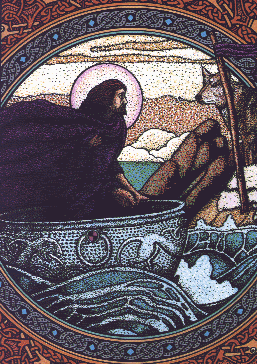 Later in life, Saint Petroc left the monastery, embarking on a hermit’s life, living alone, communing with the Lord in prayer and fasting, and engaging in self-deprivation and mortification. Despite his hermit-like ways, he felt called to establish another monastery at Bodmin—Bothmena Monastery (Abode of the Monks), and receiving permission to do so, developed a thriving monastic community there. For the remainder of his days, Saint Petroc continued to travel occasionally to visit the many religious communities he founded, and during one such journey, died peacefully surrounded by his companions. His relics are entombed in an ivory casket at the monastery in Bodmin, where they are venerated today.
Later in life, Saint Petroc left the monastery, embarking on a hermit’s life, living alone, communing with the Lord in prayer and fasting, and engaging in self-deprivation and mortification. Despite his hermit-like ways, he felt called to establish another monastery at Bodmin—Bothmena Monastery (Abode of the Monks), and receiving permission to do so, developed a thriving monastic community there. For the remainder of his days, Saint Petroc continued to travel occasionally to visit the many religious communities he founded, and during one such journey, died peacefully surrounded by his companions. His relics are entombed in an ivory casket at the monastery in Bodmin, where they are venerated today.Year 2: Day 155 of 365
Prayer Intentions: Humility, Obedience, Service.
Requested Intentions: Successful employment for couple (K); For employment for children (K); For health of friend, for successful relationships for children, for safe pregnancy for daughter (C); For the health of a mother (J); Virtue for daughter (V); Successful acceptance to college for nephew (M); For the health of a cousin (T); Freedom from legal difficulties for husband (S); Husband’s freedom from illness (L); Personal intentions (S); Successful passing of dental board examination (P); Blessings on a family (Z); Successful permanent employment (C); Healing of a son with autism (J); Son’s successful employment (L); For the intentions of family and relatives, for the Carthusian community (T); For personal intentions (A); Restoration of lost hearing (C); Resolution of relational and financial challenges (S); Comfort following loss of husband, security for family, assistance with housing (B); Healing and return of brother (O); Successful hermitage foundation (S); Support from family, permission to marry (H); Recovery of wife following surgery, freedom from depression (W); Protection and recovery of mentally ill daughter (J); Successful resolution to legal proceedings (N); Freedom from worry and successful employment (M); For successful sale of home and freedom from debt (J); Freedom from pain and illness (E).
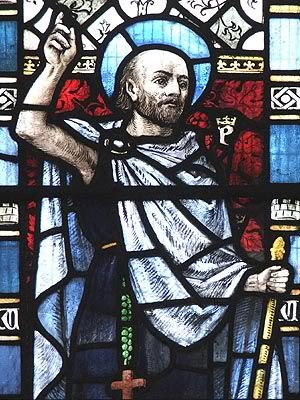
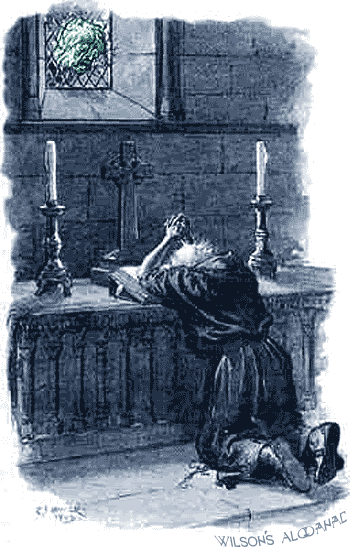
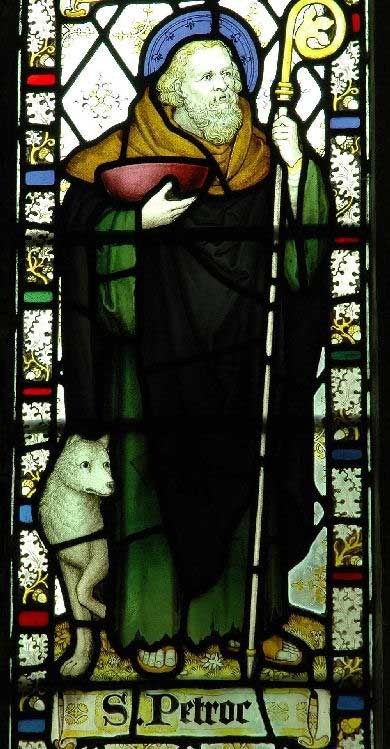
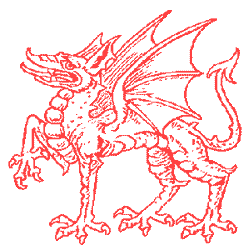
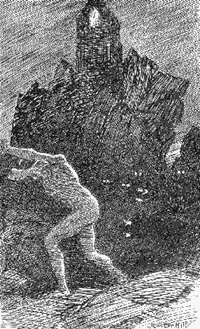
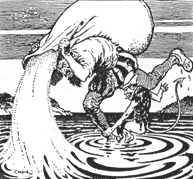
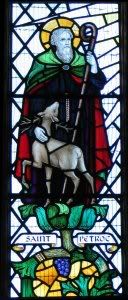
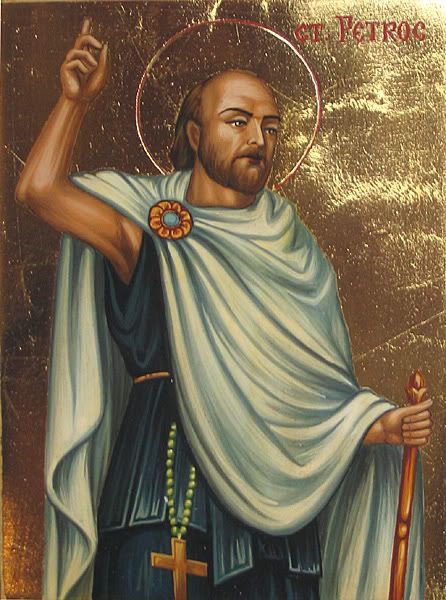
No comments:
Post a Comment
Thanks for leaving a comment. If you wish to submit a prayer request, however, please do so above, using the "Contact" tab.